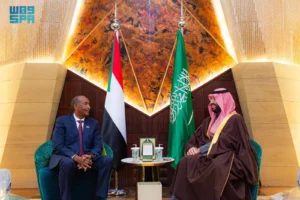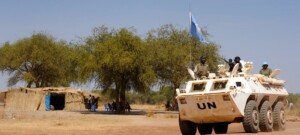Sudan’s Alliance for Freedom and Change meets AU commissioner
On Friday, a delegation of the Alliance for Freedom and Change arrived in Addis Ababa to meet with members of the AU Commission and African foreign ministers. International partners of Sudan who met in Berlin on Friday commended the AU for its attempts to solve the political crisis in Khartoum.
 Members of the Alliance for Freedom and Change and Mohamed Lebatt, Envoy of the AU to Sudan (R) in Addis Ababa, June 21, 2019 (sudanakhbar.com)
Members of the Alliance for Freedom and Change and Mohamed Lebatt, Envoy of the AU to Sudan (R) in Addis Ababa, June 21, 2019 (sudanakhbar.com)
On Friday, a delegation of the Alliance for Freedom and Change arrived in the Ethiopian capital Addis Ababa to meet with members of the African Union Commission and African foreign ministers. International partners of Sudan who met in the German capital on Friday commended the leading role played by the African Union for its attempts to solve the political crisis in Khartoum.
The delegation consists of Maryam El Sadig, co-vice president of the National Umma Party, Wajdi Saleh, member of the National Consensus Forces, economic expert Hasan Abdelati, University Professor Montasir El Tayeb, and Moataz Saleh.
The delegation met with Moussa Faki, Chairman of the African Union Commission, and his deputy Mohamed Lebatt, Envoy of the AU to Sudan, and discussed with them the developments in Sudan.
Salva Kiir, President of South Sudan, sent an advisor to Khartoum on Thursday. He met with Lt Gen Abdelfattah El Burhan, Chairman of the Transitional Military Council, and members of the Alliance for Freedom and Change.
Mediation
On June 7, Abiy Ahmed, Ethiopia's prime minister arrived in Khartoum in an attempt to ease the political crisis between the Transitional Military Council and the AFC about the formation of a new interim government before general elections will be held. The junta wants it to be military-led, while the AFC which represents the Sudanese protesters, calls for a civilian-led goverment of technocrats.
In addition, the AU Envoy to Sudan announced the establishment of an international mechanism to support AU mediation in the country. Lebatt told reporters on June 13 that the international component will be composed of the Sudan Troika (USA, the UK, and Norway), the EU, and permanent members of the UN Security Council.
The African mediation will consist of two tracks: The first one will be led by an AU team, the second track by the Ethiopian prime minister.
The Intergovernmental Authority on Development (IGAD) warned last week for “the interference of other external actors and proliferation of initiatives”, and has called on “all external actors to rally behind the IGAD and AU mediation process”.
Troika
The Sudan Troika (USA, the UK, and Norway) met in Berlin on Friday, to discuss the situation in Sudan. Saudi Arabia, the United Arab Emirates, and Egypt were also invited, as those countries are backing the military junta.
Ambassador Philipp Ackermann, Director-General for Africa, Near and Middle East, Africa, and Latin America of the German Foreign Office chaired the “informal coordination meeting on Sudan”.
In a brief statement on Friday, Ackermann says that “The events of June 3 were a tragedy. It is important that there is no further violence against the Sudanese people, and that those responsible for such acts are held accountable”.
He further stated that the international partners at the meeting underlined “the importance of unified and coordinated mediation efforts in support of negotiations leading to a civilian-led transitional government that is acceptable to the Sudanese people”. They commended the leading role played by the African Union as well as by neighbouring countries.
The partners noted that the formation of a civilian-led government as the outcome of the negotiations would be an essential step in facilitating the provision of economic and technical support for Sudan, and ensuring the political stability of Sudan.
Political crisis
When the Sudanese took to the streets in December last year, in protest against the policies of the ruling National Congress Party under the leadership of President Omar Al Bashir, the Sudanese Professionals Association (SPA, an association of groups of professionals, many of them working in the medical sector) took the lead, and called for a big protest march in Khartoum on 25 December, the first of many.
On January 1, young doctor Mohamed Naji El Asam, member of the SPA secretariat, announced the Declaration of Freedom and Change, signed by the SPA, the Sudan Call (a coalition of armed movements, opposition parties, and civil society organisations), opposition parties allied in the National Consensus Forces, and the Unionist Gathering.
Four months later, thousands of demonstrators responded to the call of the Alliance for Freedom and Change (AFC) to march to the Ministry of Defence in Khartoum and appeal to the military for support. This led to a large sit-in in front of the army command. Al Bashir was ousted in a military coup on April 11.
The members of the Transitional Military Council began negotiating the composition of a new government with the AFC. On May 13, an initial agreement was reached on a three-year transitional period after which general elections are to be held.
Three days later however, the TMC suspended the dialogue, until the barricades set-up by protesters on the main roads in the capital Khartoum would be removed. On June 3, the sit-in was violently dismantled. More than 100 protesters were reportedly killed. The military junta announced the suspension of all negotiations and revoked all agreements with the AFC. Instead, they called for a general election within a period of nine months.
The AFC as well suspended the talks. They said they will only restart negotiations if the TMC assumes responsibility for the dismantling of the Khartoum sit-in which resulted in more than 100 deaths and hundreds of injured protesters.
Lt Gen Abdelfattah El Burhan, called on the AFC this week to return to the negotiation table “unconditionally”.
Ethiopia's prime minister, Abiy Ahmed, was expected to hand his proposal for solving the crisis on Friday.
Our editorial independence means that we can continue to provide factual updates about ongoing protests to Sudanese and international actors, educate people about how to avoid outbreaks of contagious diseases, and provide a window to the world for those in all corners of Sudan. Support Radio Dabanga for as little as €2.50, the equivalent of a cup of coffee.












 and then
and then